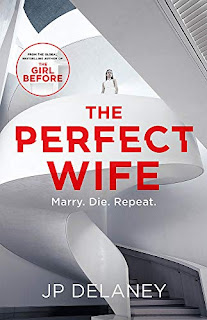The Perfect Wife - J.P. Delaney
From personal assistants like Siri and Alexa, it’s not too much of a leap however to imagine the next stage being chatbots for customer service (I’m not assured that we aren’t already there) to shopbots as sales assistants (likewise). That’s already the stage that Scott Robotics have arrived at in J.P. Delaney’s The Perfect Wife when their chief executive Tim Scott takes the leap to the next stage and creates a ‘replica’ of his wife, Abbie.
What has driven this technological advancement is personal tragedy. Tim’s wife has died and he has turned all his energies towards the development of ‘cobots’, companion robots. The potential for AIs with empathic responses designed to look like a lost love one is obvious, their memories uploaded from the vast amounts of documentation, social media accounts available creating a ‘neural file’ that can then intuitively, through coding, start intuiting and filling in any gaps. Five years in development, Scott Robotics have built a replica that is almost indistinguishable from the real Abbie Cullen.
There’s more to it than that evidently. For a start, there is no certainty that the real Abbie Cullen is dead. She disappeared one night going surfing on their private beach, generating rumours that Tim Scott murdered his own wife. The creation of a cobot Abbie then proves to be quite controversial, but it also calls into question Scott’s real motives. The AI Abbie, since she is programmed that way, soon turns out to have a mind of her own and is naturally curious to know what happened to Abbie. And perhaps that’s what Tim wants as well, but maybe not for the same reasons.
Like any good SF thriller – and I certainly wasn’t expecting one from J.P Delaney (The Girl Before, Believe Me) – there’s real-world application in The Perfect Wife, a contemporary relevance and premonitory consideration of the dangers of where such technology can lead. As far as robotics go, as I’ve said, we’ve seen it all before, but Delaney is less interested in the dystopian element of robots outsmarting and enslaving their human creators than taking in the wider angle on technology being used for entrapment, surveillance and control. The use of an autistic child, Danny, also presents a thoughtful consideration of what it means to be “differently human”.
And of course there’s a female angle on this, but one that is significantly advanced on the typical paranoia conspiracy thriller where a woman is in peril from a suspiciously behaving and controlling misogynistic man. Abbie’s dilemma is more than her husband Tim Scott having all the technological means at his disposal to track and monitor her behaviour – although this definitely ups the stakes in the thriller side of things – but it’s his desire to modify it when she doesn’t meet the creepy ideal of ‘a perfect wife’, literally moulding her and building from scratch.
Even if the psychology is a little suspect, it’s an interesting premise that raises The Perfect Wife quite a bit above the regular man-hating paranoia thriller, bringing technology into the equation and even questioning the underlying rationale for technology and robotics, or rather challenging the notion of technology (and human beings) to strive for perfection. It’s also a superbly written thriller, consistently advancing the suspense elements, bringing revelations that all is never quite what it seems. The use of second-person perspective for sections of the book is intriguing, obsessive and even invasive, and you don’t use that voice unless you have a reason for it.
Inevitably the ending can’t entirely live up to the premise and The Perfect Wife does tend to tie itself up in twists that don’t really add up, but for the most part J.P. Delaney’s latest thriller does present a new and fresh outlook on the use of technology and robotics that is different from the usual SF treatment of the subject questions, and it manages to be a great thriller that will have you puzzled and guessing – and maybe even a little bewildered – right up to the end.




Comments
Post a Comment